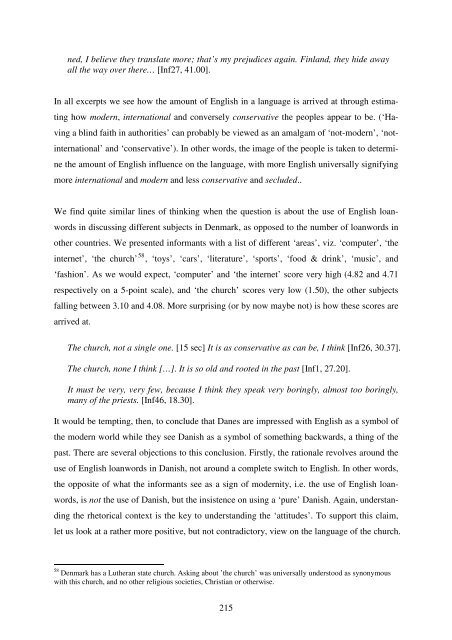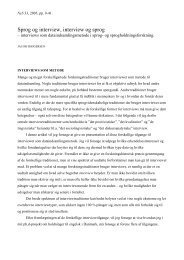Hør dog hvad de siger - Note-to-Self: Trials & Errors
Hør dog hvad de siger - Note-to-Self: Trials & Errors
Hør dog hvad de siger - Note-to-Self: Trials & Errors
You also want an ePaper? Increase the reach of your titles
YUMPU automatically turns print PDFs into web optimized ePapers that Google loves.
ned, I believe they translate more; that’s my prejudices again. Finland, they hi<strong>de</strong> away<br />
all the way over there… [Inf27, 41.00].<br />
In all excerpts we see how the amount of English in a language is arrived at through estima-<br />
ting how mo<strong>de</strong>rn, international and conversely conservative the peoples appear <strong>to</strong> be. (‘Ha-<br />
ving a blind faith in authorities’ can probably be viewed as an amalgam of ‘not-mo<strong>de</strong>rn’, ‘not-<br />
international’ and ‘conservative’). In other words, the image of the people is taken <strong>to</strong> <strong>de</strong>termi-<br />
ne the amount of English influence on the language, with more English universally signifying<br />
more international and mo<strong>de</strong>rn and less conservative and seclu<strong>de</strong>d..<br />
We find quite similar lines of thinking when the question is about the use of English loan-<br />
words in discussing different subjects in Denmark, as opposed <strong>to</strong> the number of loanwords in<br />
other countries. We presented informants with a list of different ‘areas’, viz. ‘computer’, ‘the<br />
internet’, ‘the church’ 58 , ‘<strong>to</strong>ys’, ‘cars’, ‘literature’, ‘sports’, ‘food & drink’, ‘music’, and<br />
‘fashion’. As we would expect, ‘computer’ and ‘the internet’ score very high (4.82 and 4.71<br />
respectively on a 5-point scale), and ‘the church’ scores very low (1.50), the other subjects<br />
falling between 3.10 and 4.08. More surprising (or by now maybe not) is how these scores are<br />
arrived at.<br />
The church, not a single one. [15 sec] It is as conservative as can be, I think [Inf26, 30.37].<br />
The church, none I think […]. It is so old and rooted in the past [Inf1, 27.20].<br />
It must be very, very few, because I think they speak very boringly, almost <strong>to</strong>o boringly,<br />
many of the priests. [Inf46, 18.30].<br />
It would be tempting, then, <strong>to</strong> conclu<strong>de</strong> that Danes are impressed with English as a symbol of<br />
the mo<strong>de</strong>rn world while they see Danish as a symbol of something backwards, a thing of the<br />
past. There are several objections <strong>to</strong> this conclusion. Firstly, the rationale revolves around the<br />
use of English loanwords in Danish, not around a complete switch <strong>to</strong> English. In other words,<br />
the opposite of what the informants see as a sign of mo<strong>de</strong>rnity, i.e. the use of English loan-<br />
words, is not the use of Danish, but the insistence on using a ‘pure’ Danish. Again, un<strong>de</strong>rstan-<br />
ding the rhe<strong>to</strong>rical context is the key <strong>to</strong> un<strong>de</strong>rstanding the ‘attitu<strong>de</strong>s’. To support this claim,<br />
let us look at a rather more positive, but not contradic<strong>to</strong>ry, view on the language of the church.<br />
58 Denmark has a Lutheran state church. Asking about ’the church’ was universally un<strong>de</strong>rs<strong>to</strong>od as synonymous<br />
with this church, and no other religious societies, Christian or otherwise.<br />
215



